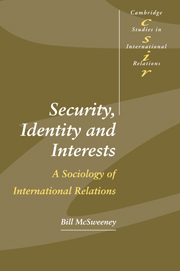Book contents
- Frontmatter
- Contents
- Acknowledgements
- Introduction
- 1 The meaning of security
- Part I Objectivist approaches to international security
- Part II Theorizing security: the turn to sociology
- Part III Practising security
- 10 Doing security by stealth
- 11 Conclusion: Security and moral choice
- Bibliography
- Index
- CAMBRIDGE STUDIES IN INTERNATIONAL RELATIONS
11 - Conclusion: Security and moral choice
Published online by Cambridge University Press: 22 September 2009
- Frontmatter
- Contents
- Acknowledgements
- Introduction
- 1 The meaning of security
- Part I Objectivist approaches to international security
- Part II Theorizing security: the turn to sociology
- Part III Practising security
- 10 Doing security by stealth
- 11 Conclusion: Security and moral choice
- Bibliography
- Index
- CAMBRIDGE STUDIES IN INTERNATIONAL RELATIONS
Summary
The principal focus of attention throughout this book has been the problem of security in the international order – how we define it, how we understand it in relation to everyday concerns, and how we define the threats and policies consequent upon a particular understanding of it. What began as an attempt to clarify and develop this concept in the relatively clear waters of the security studies mainstream, has ended in murkier currents. What started under the stimulus of Buzan's contribution to that tradition, has emerged along a deviant path into the tradition of sociology which he rejected. Identity, interests and moral choice – these are the sub-themes which came together in the course of the discussion and which, in the end, appear to be inseparably linked in any adequate account of security and security policy, whether at the academic or the policy-making level.
In addition, the problem had to be addressed of including a wider range of human needs under the heading of a concept traditionally defined in narrow, operational terms, without losing analytical control of the security needs of collectivities, including states.
If these are seen as underlying topics of the general concern with security, an overarching thesis was identified early in the discussion, gradually emerging as the condition for handling the interrelation of the sub-themes and, at the same time, the outcome of identifying them as such. This relates to the question of what kind of world it is in which the idea of security and security policy arises.
- Type
- Chapter
- Information
- Security, Identity and InterestsA Sociology of International Relations, pp. 198 - 219Publisher: Cambridge University PressPrint publication year: 1999

